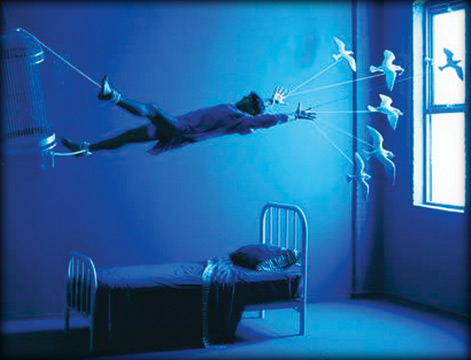Are you a lucid dreamer?
|

Finding yourself naked in public is a common recurring dream |
New research finds that those who spot the logical flaws of their
dream-world are likely to show greater insight when awake
You're in a lecture hall giving the talk of your life, when you
suddenly become aware of the fact that you aren't wearing any trousers.
Embarrassed, you look up to see if anyone has noticed, only to be met by
a sea of three-eyed aliens.
Do you continue your talk, fearing the repercussions for your career,
or do you say to yourself: "Hang on, the only way this could possibly be
happening is if this is a dream. Let's just jump on that passing flying
banana and go and have some fun."
If you're more likely to do the latter, then you are a lucid dreamer.
During your nightly adventures, your brain detects you are in a dream
because events would not make sense otherwise. Researchers at the
University of Lincoln have discovered that this ability to pick up on
logical flaws in your dream-world translates into a talent for spotting
hidden connections and inconsistencies in the real world, leading to
greater insight and problem-solving skills.
Dr Patrick Bourke, Senior Lecturer at the Lincoln School of
Psychology, says: "It is believed that for dreamers to become lucid
while asleep, they must see past the overwhelming reality of their dream
state, and recognise that they are dreaming.
"The same cognitive ability was found to be demonstrated while awake
by a person's ability to think in a different way when it comes to
solving problems."
|

Not everyone experienced lucid dreams |
To investigate the connection between our sleeping and waking minds,
the researchers examined 68 participants between the ages of eighteen
and 25, ranging from frequent lucid dreamers to those who had never
experienced the awareness of being in a dream state.
They were all asked to solve a collection of "compound remote
associate" problems designed to measure insight. In this type of test,
subjects are presented with three words and asked to find a fourth one
that forms a new compound word with each of the initial words.
An example would be the words "age," "mile," and "sand," for which
the solution is "stone."
Participants who frequently experienced lucid dreaming solved 25
percent more of the word association problems than the non-lucid
dreamers.
The cognitive skill involved in solving this particular kind of
problem has previously been linked to insight and creative
problem-solving, leading the researchers to believe that the same
processes which alert us to the façade of our dream-world help us make
sense of reality when we are awake.
- The Independent
|

